These living room fireplace ideas will create a striking focal point
Design and plan the perfect living room fireplace ideas with this handy ideas guide for a cosy snug space or a welcoming sitting room
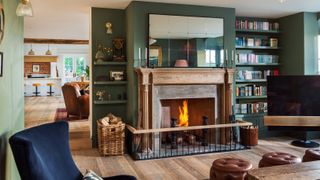
When styling and planning living room fireplace ideas there is a lot to juggle. This sometimes bulky feature can protrude into a room and dictate the size and placement of almost every piece of furniture within a living space.
Gone are the days when a fireplace was the only form of heating in a room, so it can be hard to know what to do with these eye-catching but sometimes imposing architectural elements.
In this guide, find out how to balance fireplace ideas that suit your home with the style of living room you're aiming to create.
How to layout a living room with a fireplace
When planning your living room ideas with the hope of including a fireplace, the first place to start is by creating a scale drawing of the room — measure walls, ceiling heights and chimney breast alcoves. Also mark on immovable parts of the room, like radiators, windows and doors.
Then, think about how you will use the room. Will it be to watch TV primarily (if so, mark on the plan where it will go), or will it also be used to host board games nights or casual conversations with visitors?
With this in mind, count how many sofas and chairs you will need. Play around with coffee tables, armchairs and L-shaped sofas of different dimensions and where they will go. It's also always nice to have a couple of seats by the fire for colder days so cater for this positioning.
This will begin to shape your plan for the layout. And to help further, read on below for some clever ideas for planning a living room with a focal fireplace.
1. Position seating carefully around a fireplace
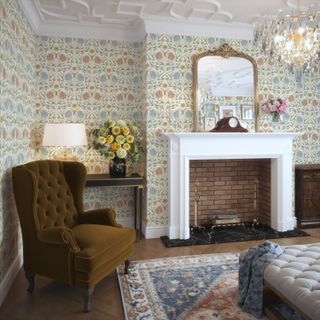
Is there anything more welcoming than a chair by the fire on a cold winter's night? Your living room layout ideas and where you position your furniture might well be dictated by a fireplace so you feel the benefit on a chilly night. But this should also be balanced with comfort — you don't want to be sat too close that you're sweating rather than enjoying the comfort of a warm fire.
A space of around a metre should protect you and your furniture from the heat of a fire. However, if you tend to have a lot of wood and equipment around your fireplace then more space might be required.
For gas fires you can sit much closer as they don't spit, but a good distance is always recommended for safety and comfort.
2. Use the fireplace to inspire other architectural elements in a living room design
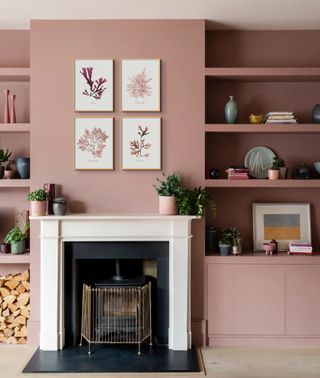
Fireplaces are usually the most enticing part of a living room, catching the eye of visitors upon entering the room, and acting as a visual focalpoint.
In renovations and modern extensions alike, fireplaces can be used to inspire other interesting features in a living room. Take chimney breast ideas — they could provide inspiration for the alcoves next to a fireplace in terms of form, colour treatment or detailing.
This is especially true for Victorian tiled fireplace ideas where colours can be picked out or floral motifs can be mimicked in the wider room.
The height of built-in shelving and storage in the stylish living room shown above has been lined up with the fireplace inset for a cohesive look. The whole wall feels like an architectural feature, rather than an exercise in storage for awkward spaces.
3. Make a fireplace the centre of your country-style living room
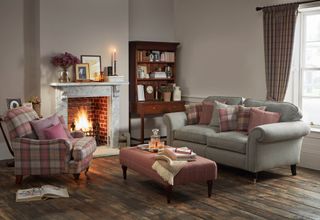
Fireplaces are ideal for inspiring a living room's decor — anything from mid-century modern to New England styles.
If you've inherited a particular style by opening up a fireplace during a renovation, do some research into the building's history and any later additions that might shed light on its past.
For new living rooms, choosing a fireplace in the style of our new space or intended interior design scheme will help pull the room together — if this feature is out of place, the scheme won't work.
Here, a quintessential country living room has been created around the existing open brick fireplace ideas. The open fire combined with deep armchairs and sofas is undoubtedly welcoming and rustic.
4. Place a rug in front of a stove fireplace
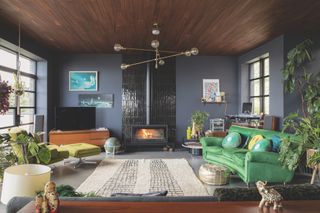
If you have a carpet or other soft flooring choice in your cosy living room, you might want to consider a rug in front of a stove to protect it if you don't want to incorporate large fireplace heath ideas.
Open fires spit and even when you're refilling a stove, embers and ash can fly out and catch on a carpet.
There are rugs and mats specifically designed to be placed next to a fireplace that won't be as flammable (look for a Fire Retardant/Resistant label like this one from Amazon) or mark from debris.
5. Use accessories around a fireplace to bring a living room to life
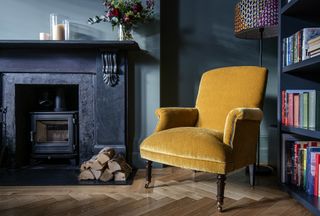
The key to a comfortable living room or snug lies in the added extras that make a space unique and personal. This is where fireplaces come into their own.
Mantelpiece ideas are ideal for displaying fresh flowers, candles, mirrors and pictures, while a hearth can provide a more practical, yet rustic use for styling kindling and log stores. Play with different heights of objects against a fireplace as it can transform how a living room feels when you hunker down at night.
Beside the fireplace, a carefully positioned floor lamp or wall light will be far more comforting and warming than overhead downlights which can feel clinical.
6. Create a living room perfect for conversations
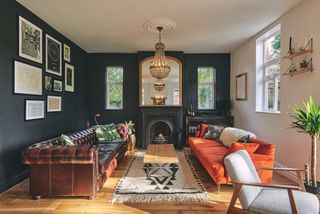
Position sofas perpendicular to a fireplace for a space that feels open for conversation, even if you will also use it for watching TV.
Using the dimensions of the outer edges of a fireplace creates a visual geometry that will give the living room a clear flow for visitors to follow. This is also a useful tool to avoid agoraphobic furniture placements, where every item is against a wall.
Furniture in the centre give a living room identity and confidence (while not encouraging a cavernous space at its core).
Get the Homebuilding & Renovating Newsletter
Bring your dream home to life with expert advice, how to guides and design inspiration. Sign up for our newsletter and get two free tickets to a Homebuilding & Renovating Show near you.
Assistant Editor Amy began working for Homebuilding & Renovating in 2018. She has an interest in sustainable building methods and always has her eye on the latest design ideas. Amy has interviewed countless self builders, renovators and extenders about their experiences for Homebuilding & Renovating magazine. She is currently renovating a mid-century home, together with her partner, on a DIY basis, and has recently fitted her own kitchen.
